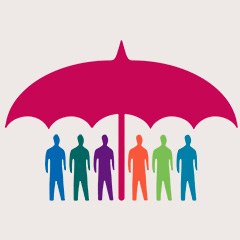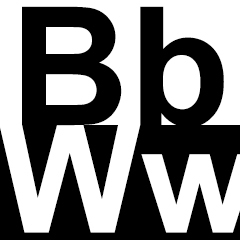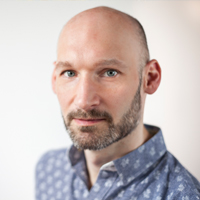Inclusive Language
When we share stories in text, audio, and video, we strive to be accurate and respect the dignity and humanity of our partners and community.
Sometimes this means using more words to convey a message; sometimes it means using text, audio, and video to communicate the same thing; sometimes the community we are writing about will have a preferred term to use instead of one we may prefer.
As MacArthur Staff decide what words to use or stories to tell, we consider the audience, the context, and the relationships at play. We also provide guidelines for asset-based language to serve as a resource and provide options on the use of language. Our resources include a glossary, inclusive alternatives for some commonly encountered phrases, and grammatical guidelines. We emphasize that when we communicate, our aim is to be in right relationship with the communities we seek to serve.
These are some of the principles we include, alongside more specifics:
- Seek and respect self-identifications.
- Name specific communities; name the systems you seek to change; name the strategy; name equity.
- Use proper nouns, or names used for and by persons, communities, and organizations, because they convey respect, understanding, acceptance, and clarity.
- Only identify race, ethnicity, gender, sexuality, and other identifiers when they are relevant to the content, avoid tokenizing.
- Use inclusive and accessible language and design.
- Center people and avoid using adjectives as nouns for people.
- Use the active voice, emphasize agency.
We emphasize solutions and assets over problems and deficits. When we talk about communities with whom we work, we emphasize their personhood, dignity, and agency, rather than their challenges and disenfranchisement.
Our thinking on communications is not intended to ignore historical inequities. We recognize grant applicants often find it necessary to highlight deficits and disparities in funding requests to make the case for support. We, however, will not define people by the challenges they face. We will highlight their strengths, aspirations, and contributions to society. We will also demonstrate how inequitable systems, rather than individual actions, created the current conditions that exist.
Language is fluid. We are committed to continually review, revisit, and refine our use of language to be as representative and inclusive as possible.
Related Content
Accessibility
We are committed to increasing access and participation for people with disabilities at MacArthur events, both at the Foundation and at outside venues. We are also working to ensure that our invitations to such events are more welcoming. We have benchmarked our website against standards for accessibility for people with disabilities, made significant enhancements, and are eager to share what we have learned with our grantees. We have made it easier for visitors to access our historic headquarters building, and we are modifying our emergency preparedness communications and practices to improve our support for tenants and guests with disabilities.
Related Content
Our Land Acknowledgement
Our Chicago office is situated on the lands of the Potawatomi people. They were the stewards of this land and lived, loved, and cared for it until forced out by non-Native settlers. Tribes that have historical relationships with the lands in greater Chicago and Northern Illinois through trade, travel, and habitation also include the Odawa, Ojibwe, Peoria, Kaskaskia, Miami, Ho-Chunk, Menominee, Mascouten, Kickapoo, and Meskwaki, as well as mound builders and other tribes whose names have been lost as a result of genocide and ethnocide of European colonialism and United States expansion. This land continues to be home to Indigenous people. Chicago is home to one of the largest urban Indigenous populations in the United States.
Our mission leads with justice, and we must reckon with historical and ongoing injustices, erasures of Indigenous people, and appropriations of their lands, cultures, and resources. We are connected to Indigenous people in Chicago, Illinois, and around the world. We are committed to partnering with and supporting Indigenous people and nations as they continue to advocate for and maintain sovereignty and self-determination, educational opportunity, economic development, healthcare, cultural preservation and promotion, and in all other ways that promote Indigenous communities and support truth, healing, and reconciliation between Native and non-Native people.
Bodéwadmikik ėthë ték i MacArthur Foundation miktthéwiwgëmëk. Nëko shna wgi këwabdanawa shodë kik, minė gé shode shna anet gathë dnezwat, neshthé wėth bgeshmok wthë igwan wgi zhë nashkëwaywik. Winwa gé zhé, nëko shna wgi dnezwêk shode Zhegagoynak, gi Odawa, Ojibwe, Peoria, Kaskaskia, Miami, Ho-Chunk, Menominee, Mascouten, Kickapoo, Meskwaki zhenkazwik minė gé anet Gété Neshnabék. Ngodêk shna shodë wgi dnezwêk bwamshé byawat gi ktthemokmanêk. Mégwa shna ngom shodë dnezwêk gi neshnabék, manék godë neshnabék ėthë dawat shode Zhegagoynak.
Nnedwéndamen gé ninan wéwénė ėwi mnozhë'aywat minė ėwi wdeténmaywat godë neshnabék. Nde ndo with miktthéwimak neshnabék, nëkmëk shna wthebyéwêk. Bédo wina ėwi nizhokmëwayak thayék gi neshnabék thak shna gégo nigan wthë igwan ėnkëmgezwat... ėzh dbakwnëgéwat, ėzh kenomagéwat, shonya ėzh mkëmwat, mshkëkiwen, minė gé neshnabé zhetthkéwen. Nnedwéndamen gé ėwi nsetwaywat gi neshnabék.
Translation by Bmejwen / Kyle Malott, an enrolled citizen of the Pokagon Band of Potawatomi.
Pronunciations
Potawatomi (pah-tuh-WAH-tuh-mee)
Odawa (oh-DAH-wah)
Ojibwe (oh-JIB-way)
Peoria (pea-OR-ee-ah)
Kaskaskia (kahs-KAHS-kee-ah)
Miami (me-YAH-me)
Ho-Chunk (HOE-chunk)
Menominee (meh-NOM-ih-nee)
Mascouten (MEH-skaw-tin)
Kickapoo (kih-KAH-poo)
Meskwaki (meh-skw-AH-key)





